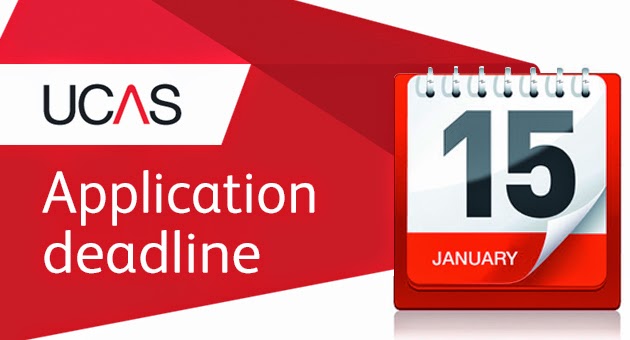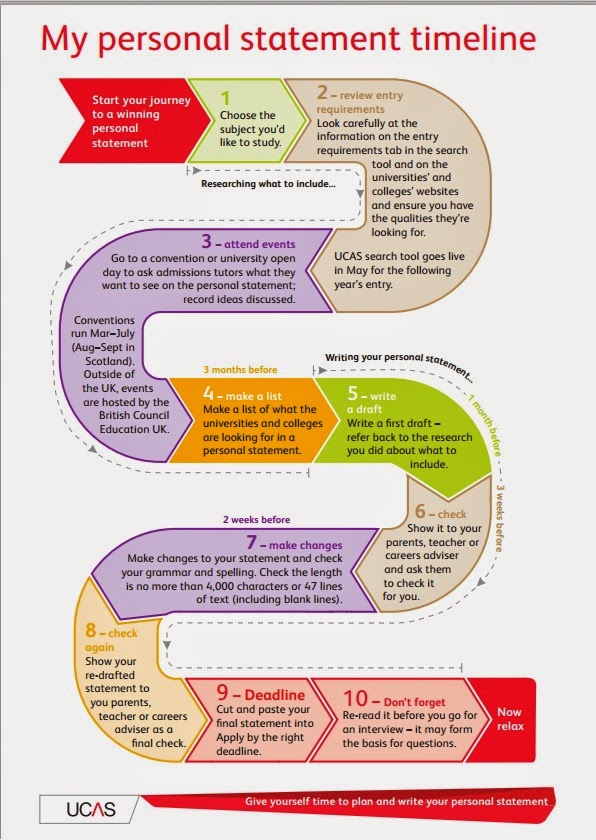It’s never nice to see someone miss the 15 January deadline.
We know how much work you've
put into your application, how much frustration
there can sometimes be with it and the hopes you have pinned on it.
Missing the deadline means your university choices no longer
have an obligation to consider your application. Some can choose to consider
you after 15 January but it’s entirely at their discretion. However, for
those courses and universities where competition is high it’s unlikely that the
application will be considered.
Here’s the good news though: you’re reading this blog now
and not after 15 January! In most cases
for applications which miss the deadline, you can pinpoint the reason for it to
something that happened (or didn’t happen!) during the Christmas break and
early-January.
So let’s get it all out in the open. Here are the three main things
that cause issues in those vital last couple of weeks before the big day:
1. You assume your
school/college have sent your application to UCAS. And they haven’t.
Your tutors and advisers will put a lot of work into
coordinating all your UCAS applications, advising you on what to be putting
into it, what to be leaving out, writing references, checking the applications
for mistakes and then getting them sent off. It’s no easy job but it’s one they
carry out with great diligence on top of their usual workload.
However,
everyone’s human and sometimes mistakes can be made and an application might
not get sent off. These mistakes are relatively rare but that’s no consolation
to those it happens to. Thankfully it’s very quick and easy to check if it’s been
sent. So take 30 seconds to log onto
Apply and look at the Welcome page. If your school have sent the application to
UCAS, it’ll look like this (click on image to enlarge):
If they’re still
writing the reference, it’ll look like this:
If the reference has
been written but the application hasn’t been approved by your school, then it’d
look like this:
All fairly straightforward really. So, if your Welcome page doesn't say the magic words 'Your application has been sent to UCAS and will be processed shortly' you need to get in touch with your
school and ask them when this will be sent. If they've already given you a date
for when they’ll do this then there’s no need to chase them, just keep an eye
on it. However, if they've given you the impression that the application has
already been sent to UCAS, then get in touch with them and have the situation clarified.
2. Your referee hasn't finished their reference.
Every year there will always be some people (both
independent and school/college applicants) in a mad panic that their reference hasn't been finished (or started) and that they've got no way of getting in
touch with the referee. Without the reference, the application can’t be sent
off.
So, if you've exhausted all possibilities of getting in
touch with your referee and there’s no way they’re going to be able to complete
it by the deadline, here’s what you can do:
i) Get someone else to
write the reference
They way you do this will differ depending on whether you’re
applying through a school or applying independently.
If you’re applying through a school, already sent it to them and have no way of
contacting a tutor then you’d need to register a new application and complete
that one instead. However, if you've not yet sent the application to your school, you can call us and an adviser will change it to an independent application thereby allowing you to request someone else to write the reference.
If you’re applying independently and you've not clicked on the option 'Ask a registered school, college or organisation to write your reference only' you can click on the link to ask someone else to write it.
If you’re applying independently and have clicked on the option 'Ask a registered school, college or organisation to write your reference only' you’d need to call us and an adviser can
reset your reference request. You can then click on the option to ask someone
else to write it.
ii) Send it off without a
reference
This should only be done as a last resort and it carries a degree of risk. If you follow the
same steps as above for getting someone else to write the reference, you can
tick a box to say that no reference is required:
As the message states, you should only use the option if all your choices have agreed that you can send the application without a reference. If you haven’t spoken to them and
got the OK to do it, then they can choose not to consider your application if
they wish.
However, if you’re not able to get in touch with all your
choices and your options are either to not send the application by the deadline
or to get it in on time without the reference, then the second option is
obviously better.
You’d then need to get in touch with your choices as soon as
you can to explain why you had to send off your application without a reference
and to ask if they’ll still consider your application if you were to arrange
for the reference to be sent direct to them.
 |
We'll be on hand to deal with any
last-minute late-night issues on 15 January |
3. Your application
has been returned to you by your school/college for amendments and you’ve not
sent it back to them
As many of you are probably well aware, your
school can return the application to you for corrections to be made. If this
happens, you get an email from UCAS telling you to log onto Apply. Once on the
Welcome page, you’ll see a message from your school explaining what needs to be
amended.
If you do have to correct anything in your application, make sure you send it
back to the school after! You just need to click on ‘Pay/send’ (you don’t need
to pay again though). The requirement to send it back to your school sometimes
gets overlooked and results in the application not being sent by your school.
Stay Calm...
Above all though, try not to stress about it! Our Customer Service Advisers
will be putting in extra hours this week and next to answer all your queries on
our social media channels and telephone lines. They’ll also be available until
00:30 (UK time) on 16 January to make sure your questions are answered right up
until and beyond the midnight deadline.
 As the 15 January application deadline approaches, here are some of the top questions we’re answering at the moment:
As the 15 January application deadline approaches, here are some of the top questions we’re answering at the moment:








.jpg)




